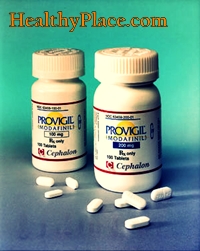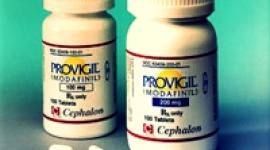Provigil (Modafinil) Patient Information
Brand Names: Provigil, Nuvigil
Generic Name:Modafinil
Provigil full prescribing information
What is Provigil?
Provigil (modafinil) is a medication that promotes wakefulness. It is thought to work by altering the natural chemicals (neurotransmitters) in the brain.
Provigil is used to treat excessive sleepiness caused by sleep apnea, narcolepsy, or shift work sleep disorder.
Provigil may also be used for other purposes not listed in this medication guide.
Important information about Provigil
You should not use Provigil if you are allergic to modafinil or armodafanil (Nuvigil).
Before using Provigil, tell your doctor if you have angina (chest pain), liver or kidney disease, a heart problem, a history of drug addiction, if you take blood pressure medication, or if you have recently had a heart attack.
 Provigil affects the central nervous system. This can cause effects that may impair your thinking or reactions. Be careful if you drive or do anything that requires you to be alert. Avoid other dangerous activity until you know how this medication will affect your level of wakefulness.
Provigil affects the central nervous system. This can cause effects that may impair your thinking or reactions. Be careful if you drive or do anything that requires you to be alert. Avoid other dangerous activity until you know how this medication will affect your level of wakefulness.
Stop taking Provigil and call your doctor if you have a skin rash, no matter how mild. A medicine similar to modafinil has caused severe skin reactions serious enough to require hospitalization. Other signs of a severe reaction include fever, sore throat, headache, and vomiting with a severe blistering, peeling, and red skin rash.
There may be other drugs that can interact with Provigil. Tell your doctor about all your prescription and over-the-counter medications, vitamins, minerals, herbal products, and drugs prescribed by other doctors. Do not start a new medication without telling your doctor.
What should I discuss with my health care provider before taking Provigil?
You should not use Provigil if you are allergic to modafinil or armodafinil (Nuvigil).
If you have any of these other conditions, you may need a dose adjustment or special tests to safely take Provigil:
- angina (chest pain);
- cirrhosis or other liver problem;
- kidney disease;
- a heart muscle or valve disorder such as mitral valve prolapse;
- a history of drug addiction;
- if you take blood pressure medications; or
- if you have recently had a heart attack.
Skin rashes serious enough to require hospitalization have occurred in people using a medicine similar to Provigil. These rashes usually occurred within 1 to 5 weeks after the first dose.
Stop taking Provigil and call your doctor at the first sign of any skin rash, no matter how minor you think it might be.
FDA pregnancy category C. It is not known whether Provigil is harmful to an unborn baby. Before taking this medication, tell your doctor if you are pregnant or plan to become pregnant during treatment. Provigil can make certain types of birth control pills less effective, which could result in an unplanned pregnancy. Talk with your doctor about the best methods of birth control to use while taking this medicine. It is not known whether modafinil passes into breast milk or if it could harm a nursing baby. Do not use this medication without telling your doctor if you are breast-feeding a baby.
Do not give Provigil to anyone younger than 16 years old.
How should I take Provigil?
Take Provigil exactly as prescribed by your doctor. Do not take it in larger amounts or for longer than recommended. Provigil is usually given for 12 weeks or less. Follow the directions on your prescription label.
This medication comes with patient instructions for safe and effective use. Follow these directions carefully. Ask your doctor or pharmacist if you have any questions.
Provigil is usually taken each morning to prevent daytime sleepiness, or 1 hour before the start of a work shift to treat work-time sleep disorders.
If you are taking Provigil to treat sleepiness caused by obstructive sleep apnea, you may also be treated with a continuous positive airway pressure (CPAP) machine. This machine is an air pump connected to a mask that gently blows pressurized air into your nose while you sleep. The pump does not breathe for you, but the gentle force of air helps keep your airway open to prevent obstruction.
Do not stop using your CPAP machine during sleep unless your doctor tells you to. The combination of treatment with CPAP and Provigil may be necessary to best treat your condition.
Provigil will not cure obstructive sleep apnea or treat its underlying causes. Follow your doctor's instructions about all your other treatments for this disorder.
Talk with your doctor if you continue to have excessive sleepiness even while taking this medicine.
Taking this medication does not take the place of getting enough sleep.
Store this medicine at room temperature away from moisture and heat.
What happens if I miss a dose?
Take the missed dose as soon as you remember, but avoid taking the medication if you do not plan to be awake for several hours. If it is close to your normal bedtime hour, you may need to skip the missed dose and wait until the next day to take the medicine again.
Talk with your doctor about what to do if you miss a dose of Provigil. Do not take extra medicine to make up the missed dose.
What happens if I overdose?
Seek emergency medical attention if you think you have used too much of this medicine.
Overdose symptoms may include feeling excited or agitated, confusion, trouble sleeping, nausea, or diarrhea.
What should I avoid while taking Provigil?
Provigil affects the central nervous system. This can cause effects that may impair your thinking or reactions. Be careful if you drive or do anything that requires you to be alert.
Avoid other dangerous activity until you know how this medication will affect your level of wakefulness.
Avoid drinking alcohol while taking Provigil.
Provigil side effects
Get emergency medical help if you have any of these signs of an allergic reaction: hives; difficulty breathing; swelling of your face, lips, tongue, or throat. Stop using Provigil and call your doctor at once if you have any of these serious side effects:
- fever, sore throat, headache, and vomiting with a severe blistering, peeling, and red skin rash;
- bruising, severe tingling, numbness, pain, muscle weakness;
- easy bruising or bleeding;
- white patches or sores inside your mouth or on your lips;
- hallucinations, unusual thoughts or behavior;
- depression, anxiety; or
- chest pain, uneven heart beats.
Less serious Provigil side effects may include:
- headache, dizziness;
- feeling nervous or agitated;
- nausea, diarrhea;
- trouble sleeping (insomnia); or
- dry mouth.
This is not a complete list of side effects and others may occur. Call your doctor for medical advice about side effects. You may report side effects to FDA at 1-800-FDA-1088.
What other drugs will affect Provigil?
Before using Provigil, tell your doctor if you are using any of the following drugs:
- cyclosporine (Neoral, Sandimmune, Gengraf);
- propranolol (Inderal);
- rifampin (Rifadin, Rimactane, Rifater);
- a sedative such as diazepam (Valium), midazolam (Versed), or triazolam (Halcion);
- antifungal medications such as itraconazole (Sporanox) or ketoconazole (Nizoral);
- seizure medication such as carbamazepine (Carbatrol, Tegretol), phenytoin (Dilantin), or phenobarbital (Luminal, Solfoton);
- antidepressants such as amitriptyline (Elavil, Etrafon), doxepin (Sinequan), imipramine (Janimine, Tofranil), nortriptyline (Pamelor), and others; or
- an MAO inhibitor such as isocarboxazid (Marplan), phenelzine (Nardil), rasagiline (Azilect), selegiline (Eldepryl, Emsam), or tranylcypromine (Parnate).
This list is not complete and there may be other drugs that can interact with Provigil. Tell your doctor about all your prescription and over-the-counter medications, vitamins, minerals, herbal products, and drugs prescribed by other doctors. Do not start a new medication without telling your doctor.
Where can I get more information?
- Your pharmacist can provide more information about Provigil.
Last Updated: 03/08
Provigil full prescribing information
Detailed Info on Signs, Symptoms, Causes, Treatments of Sleep Disorders
back to:
~ all articles on sleeping disorders
APA Reference
Staff, H.
(2019, August 31). Provigil (Modafinil) Patient Information, HealthyPlace. Retrieved
on 2026, January 19 from https://www.healthyplace.com/other-info/sleep-disorders/provigil-patient-information


